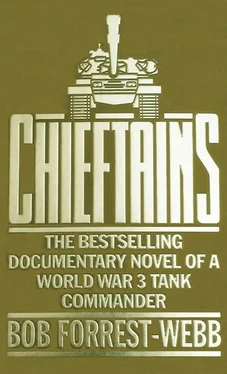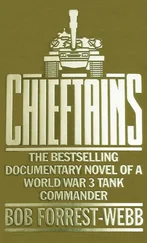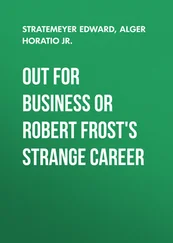The two remaining crew members of the Russian SPG were already dead. Both killed while they slept. The driver’s back had been within reach of the soldier lying flat along the hull, while the gunner had taken no notice of the man who had silently dropped in through the turret behind him believing, if he had awakened at all, it was his returning commander.
Ellen lowered the Russian’s body to the ground. A non-smoker himself, he could smell the faint coppery scent of the man’s blood; it gave him a sense of elation. His hands were sticky, he wiped them on the dead man’s overalls. He had made his first kill. Never again would he have to stand at a bar and listen enviously to the tales of his colleagues who had been in action. Now he was truly one of them; a fully-fledged member of the elite corps.
Welbeck, who had been the one to tackle the gunner, seemed to be a long time inside the tank. Lance Corporal Ellen should have waited beside the track, but didn’t. He reached the turret just as Welbeck climbed out. Welbeck reacted instinctively to the dark figure that appeared unexpectedly in front of him. His bloodstained knife was still in his hands. He drove it straight into Ellen’s chest.
Ellen felt the blow, realized what had happened but felt no pain. He had time to say quietly: ‘You stupid bugger.’ Then his legs weakened and crumpled. He dropped to his knees and felt the cold of the metal against the palms of his hands… and then nothing. His body dropped backwards from the hull to land on the corpse of the Russian he had killed only a minute earlier.
‘Everything satisfactory, Sergeant?’ Lieutenant Hinton had been waiting beside the bunker’s secondary exit.
‘Yes, sir. The area’s clean. I’ve posted guards. One casualty.’
‘Wounded?’
‘Dead, sir. Lance Corporal Ellen.’
The first of many yet to come, thought Hinton. ‘How?’
‘Bloody carelessness, sir! Disobeyed orders.’
There was no point in delving further at the moment, and Sergeant Welbeck was obviously unwilling to volunteer details. Hinton knew he would learn in time. ‘Thank you Sergeant. Get the doors open will you.’ He gave a thumbs-up sign to Fellows and swung himself into the nearest of the APCs. The sound of the Scimitar’s Jaguar engines made the air of the bunker vibrate.
There was nothing that could be done to disguise the appearance of a FV 107 Scimitar; its sharply angled turret and sloping bow resembled no armoured vehicle used by the Warsaw Pact armies. Protection for the tanks and the SAS APCs was the night itself, their speed and manoeuvrability, and the direction of their travel — westwards towards the battlefront. From a distance, in the poor light, they might be mistaken for reinforcements moving forward in support of the Soviet advance.
Hehlingen was twenty kilometers from the bunker; little mare than fifteen minutes at top speed on a good road. There were no longer any such roads, and a fast direct route was impossible.
Fellows, standing half-out of his hatch, watched the night sky towards the west. Flashes of distant light flickered like summer lightning along the horizon, and the sky itself was coloured as though it reflected the illumination of a vast city. It was almost beautiful, smoke clouds glowing scarlet, violet and a continuous pyrotechnic aurora borealis shimmering above the fields. He was feeling alert, self-confident; it had been far more of a strain on his nerves while they waited cooped up in the bunker. He still found it hard to believe that this was war, though there was plenty of evidence. Every small village or even farmhouse they passed had been destroyed, tumbled and blackened stone, crazily-angled window frames, fallen roofs, deserted… still smoking. Wrecked vehicles, some unidentifiable, others which looked as though they had simply been abandoned, littered open fields. There were bodies, corpses lying awkwardly in the wreckage; a line of uniformed men arrayed beside a hedge, neat and tidy as though ready for inspection, weapons beside them, the night hiding the bloodstains and the wounds. Shell and rocket craters, dark irregular patterns in the fields; shattered tarmac and cobbles, sewer pipes and drains, burnt woodland.
He was surprised they had seen no Russians as yet. He had expected the odd patrol or company of Engineers, but decided they must be working further north, more directly behind the main stream of the 16th Guards’ attack.
Two kilometers east of Hehlingen he led the convoy into the shattered remains of a pine wood and deployed them amongst the few undamaged trees. Now that the engines were silent the sounds of gunfire were loud; only a few kilometers towards the west. The coloured sky which at a distance had looked attractive, was now heavy, ominous.
Hinton was waiting with his platoon. ‘Don’t hang about,’ Fellows told him. ‘I don’t want my Scimitars around here too long. In and out fast, that’s the name of the game. You’ve got two hours to find the exact location and report back to me, that should be enough.’
‘Yes, sir.’
Fellows watched the men jog silently into the darkness, fading like ghosts amongst the stumps of the trees. More waiting, he thought. The whole damned war for me seems to be waiting. He almost envied the men who had remained with the regiment or who were operating as recce squadrons; they would have been in action since the first shell was fired. But this waste of time, this waiting… waiting.
21.25 hours. Day One.
Master Sergeant Will Browning thought he now knew why the Black Cavalry Squadron’s counterattack had failed. During the past hours while he and the crew of Utah waited for darkness there had been time for him to think over the possibilities. When the squadron’s Captain Harling had given the order to advance, the intention of HQ must have been to strike at the flank of the Soviet spearhead. By ill-luck, poor intelligence or plain bad timing, and Browning was unable to decide which, the counterattack had met the head of the second echelon of Russian armour and, worst of all, at a point on the battleground where the enemy artillery could give it the best possible cover.
‘The second wave of Soviet tanks, reforming after crossing the river, had been fresh into battle and received sufficient warning to enable them to deploy in readiness for the counterattack. The Soviet divisions’ main artillery, still in its positions on the eastern side of the border, was able to treat the American armour in exactly the same way the Russian artillery had dealt with the British charge of the Light Brigade, at the historical battle of Balaclava. And with the same decimating results. The losses to the Russians had been negligible. Maybe it wasn’t entirely the captain’s fault after all, Browning decided. The officer was bluff, often blustery, but West Point didn’t turn out fools; and it certainly couldn’t be the troop lieutenant’s responsibility either, because he would just have obeyed orders like the rest of them. If a mistake had been made, then it was at headquarters. Wasn’t it always!
Browning peered at his watch. He could just see the glow of its luminous dial; it was twenty-one twenty-seven. In three minutes Podini would come down off the hill where he had relieved Adams as guard, and then it would be time for them to move out.
There was plenty happening. Adams had watched a build-up of Soviet logistics on the west bank of the river. The two bridges had been in constant use for the past four hours. It appeared, in darkness at least, that the Russians were unconcerned about the threat of air attack, although the movements of their supplies column should have shown up on NATO infra-red detectors. It suggested to Browning that the Russians were feeling very confident about the present lack of NATO air surveillance, and as he hadn’t seen any US aircraft overhead since late afternoon he thought that, for the moment anyway, their efforts must be concentrated on the forward combat zone.
Читать дальше












